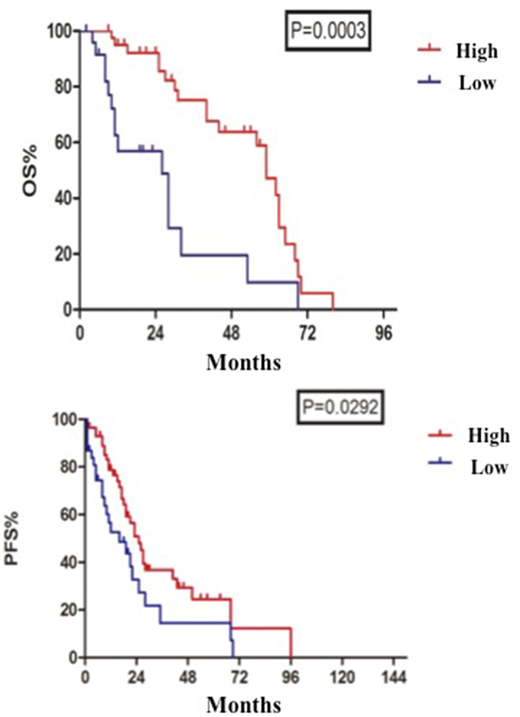Backgrounds and purposes Primary central nervous system lymphoma (PCNSL) is a rare subtype of non-Hodgkin's lymphoma. The prognosis of PCNSL is poor and heterogeneous. MicroRNA is associated with prognosis of various cancers. Our study is the first time to compare circulating microRNAs of PCNSL patients with different prognosis using miRNA microarray scanning and find novel microRNAs associated with prognosis of PCNSL by further large-scale validation.
Materials and methods From a retrospective cohort, we collected the clinical data of patients who were diagnosed as PCNSL in Huashan Hospital between January 2007 and June 2016. We collected clinical data and blood samples from residual blood routine test of PCNSLs. First, we compared circulating microRNAs between patients with different overall survival (OS) using miRNA microarray scanning. Second, PCR assay was used for miRNAs quantification in blood sample from 6 patients that had long overall survival and other 6 patients that had short overall survival. Further miRNA validation was made by PCR assay in blood sample from 94 patients to validate prognostic value of miRNAs in PCNSLs. The Kruskal-Wallis and Mann-Whitney U tests were used for quantitative parameters and the χ2 square test was used for non-quantitative parameters. Univariate analysis was performed using log-rank test, and survival distributions were analyzed by the Kaplan-Meier curve and log-rank test. Multivariate analysis was done by Cox regression model.
Results A total of 90 differentially expressed miRNAs were identified, including 24 up-regulated miRNAs and 66 down-regulated miRNAs using miRNA microarray scanning. Then PCR assay was used for 10 differentially expressed miRNAs quantification in blood sample from 6 patients that had long overall survival and 6 patients that had short overall survival. Mir-21, mir-129-5p, mir-144-5, mir-363-5p, mir-409-3p, mir-1246, mir-1299 and mir-1825 showed no differences between 2 groups, while the expression of mir-455-3P and mir-940 between 2 groups are significantly different (P<0.05). Further validation in 94 patients showed median OS in miR-940 overexpression group was 91 months and in miR-940 low-expression group was 28 months (P=0.0005), while median PFS in miR-940 overexpression group was 25 months and in miR-940 low-expression group was 16 months (P =0.0292). Multivariate analysis of COX model showed miR-940 was independent factors for OS and PFS.
Conclusion Circulating mir-940 had prognostic value in PCNSL and was an independent prognostic factor for PCNSL.
No relevant conflicts of interest to declare.
Author notes
Asterisk with author names denotes non-ASH members.


This feature is available to Subscribers Only
Sign In or Create an Account Close Modal